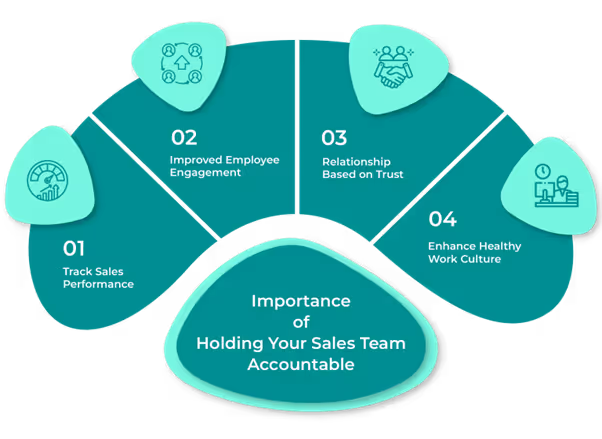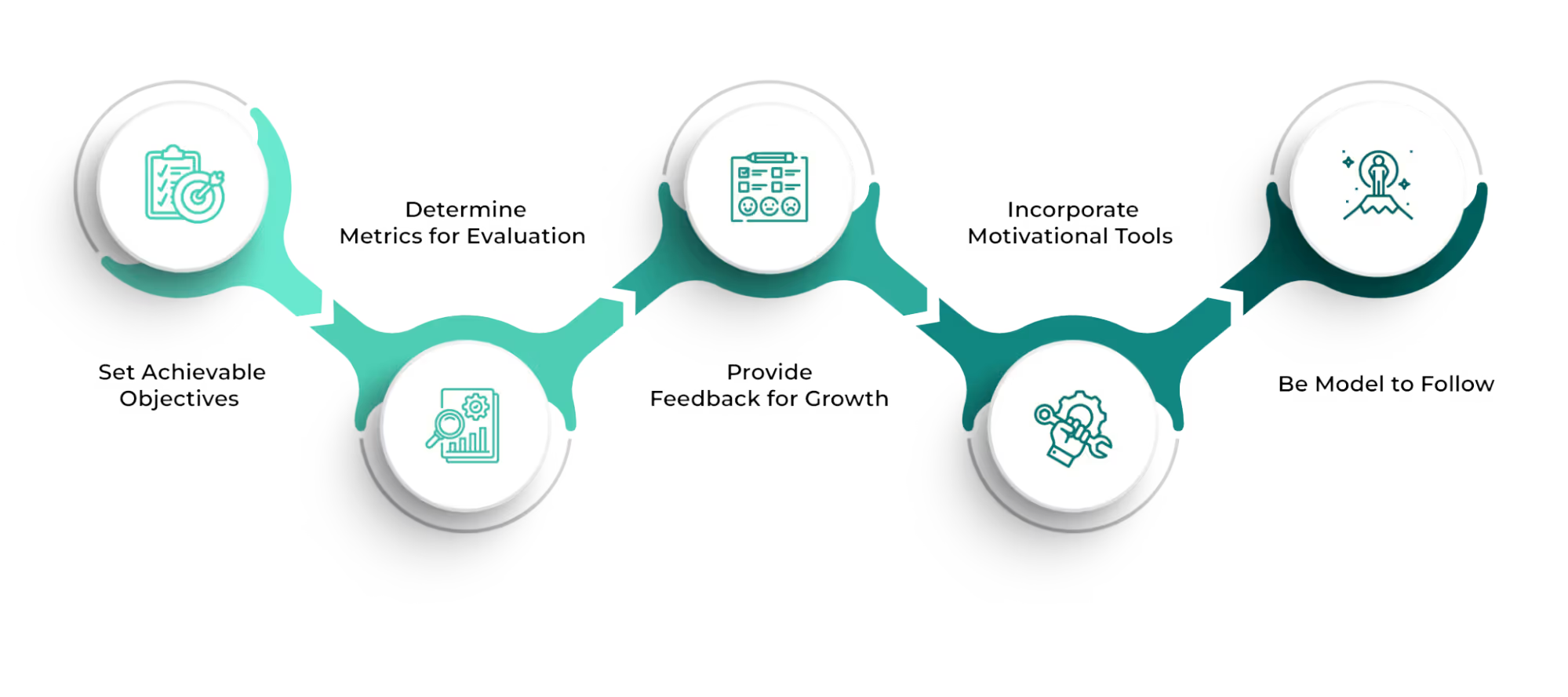
Blog
Understanding Sales Accountability: Its Significance and Effective Strategies
November 1, 2023


Key Insights
“Accountability breeds responsibility.“ – Stephen Covey
What should companies be looking for while hiring talents to be a part of their team?
More often managers look for skilled and talented people. But what they must be seeking are people who are ready to own up to their actions and take responsibility for the tasks assigned.
Skills and talent can be imbibed when the right opportunities are offered but organizations must be looking for people with accountability as it's a quality that must be in a person.
In this article, we will explore sales accountability, the importance of accountability in sales, ways to increase accountability in your salesforce, and tips to improve sales accountability.
Scroll down for more.
What is Sales Accountability?
Sales accountability is when the salesforce takes ownership of their work and is responsible for the set of tasks expected of them.
Creating a work culture where your team is accountable for their work builds confidence, helps them become independent, takes control of their progress, and motivates them to improve their performance.
Additionally, incorporating a sales incentive plan can significantly enhance their motivation and commitment to achieving their goals.
Trusting your people and their process helps them upskill and progress by aligning their goals with the company objectives.
Importance of Holding Your Sales Team Accountable?
A work culture that believes in their workforce and their capabilities will benefit in various ways, including improving sales performance. Let's explore how holding your sales team accountable is important.

- Track Sales Performance
When your salesforce is held accountable for their work, it brings clarity to both the salesperson and the manager on the set of tasks and activities they must do and the performance expected of them. This helps sales managers determine the metrics to track the sales performance as well as help the salesforce get objective feedback on areas of improvement. Implementing advanced incentive management systems further enhances this accountability, providing a structured framework to align sales goals with incentives and ensuring a fair and transparent reward system that motivates and drives improved performance.
- Improved Employee Engagement
Building a work environment where salesforce is accountable for their work also means building a work culture that trusts its team members with their assigned responsibilities. When employees feel trusted by their company, it imbibes a sense of belonging and enhances employee engagement. They align their goals with the company objectives thereby improving their sales performance and the company’s growth.
- Relationship Based on Trust
A work culture that trusts its employees will be returned with dedication and commitment. It is also one of the driving forces for improving retention, making confident decisions, and boosting performance and productivity.
- Enhance a Healthy Work Culture
When sales forces are encouraged to take ownership of the work they are entrusted with, it creates a work culture that is based on trust, belief, and confidence. Holding the sales team accountable also means no micromanagement to keep track of or interfere in every activity of the team.
The small but careful initiatives you bring into your work culture can have a huge impact on the overall success of the organization.
For further reading, check Innovative Sales Performance Management Solution.
How to Increase Accountability in Sales
Organizations must take a keen interest in improving the sales accountability of their workforce. Here are a few ways to ensure this.
- Create a sense of belonging that they are integral to the growth of their company.
- Provide goals and objectives to focus their efforts and work towards improvement.
- Be transparent about the expectations from employees and the metrics they are evaluated on.
- Trust the process. Give your salesforce time to prove their potential and don't be judgemental while assessing their work.
- Believe your employees and provide them with timely and constructive feedback to grow and improve.
- Create an ambiance and work culture of respect where employees contribute with commitment and dedication to their work and the organization.
Tips to Improve Sales Accountability
While holding the sales team accountable for their work, organizations must also ensure that they provide a sales accountability template that serves as a roadmap for the salesforce, clearly outlining what is expected of them in achieving the defined roadmap for sales targets. This template becomes an indispensable guide, aligning the team's efforts with strategic objectives and fostering a cohesive approach toward meeting and exceeding sales targets.

- Set Achievable Objectives
Sales managers must set achievable goals and sales quotas for their salesforce depending on their skill, potential, and experience. This helps them understand their set of tasks, strategize to achieve their quotas, and upskill to meet their performance metrics. As part of a broader sales transformation strategy, this process empowers the sales team to adapt and excel in an evolving marketplace.
- Determine Metrics for Evaluation
When you make your salesforce accountable for their tasks and responsibilities, there is a precondition that you make it clear what is expected of them and the metrics on which they will be evaluated. This clarity and transparency helps salesforce to meet their performance and sales managers to ensure productivity.
- Provide Feedback for Growth
Holding the sales team accountable cannot be a one-sided expectation. It must be a two-way process, where sales managers schedule regular sales coaching sessions and provide their team constructive feedback to improve their skills and progress in their performance.
- Incorporate Motivational Tools
Expecting employees to take ownership of their work and be accountable for the progress they bring is a huge stake. It requires a motivational tool that ensures that employees are focused on their goals and encouraged to progress. Implementing sales accountability inevitably calls for incorporating incentive compensation, including SPIF incentives, that rewards them for all milestones they achieve.

- Be a Model to Follow
Organizations and sales managers cannot expect their teams to be accountable unless they lead by example. Sales managers must set the mark by being committed and dedicated in their work, showing consistent upskilling and progress as well as achieving their goals and objectives.
Being responsible for the work assigned to you is a personal quality but creating an environment where employees feel acknowledged and recognized for their integrity and commitment is the responsibility of the organization.
For further reading, check Unlocking Success: Crafting a Winning Sales Performance Improvement Plan.
Conclusions
Each sales team has their way of assigning sales representatives with tasks. Some take into consideration revenue generated or volume sold, while others look at the number of calls and emails made.
Hence sales accountability examples can be varied depending on what the organizations assign their salesforce and expect from them. Despite the variety of tasks and activities, taking ownership of your responsibilities, doing the work with commitment and dedication, and improving consistently are universal expectations from all employees.
But organizations simply can't expect progress from employees unless they provide an external push and motivation that will help the salesforce stay in focus. Sales commission is one perk through which an organization ensures consistent progress.
Build, run, and automate your sales incentive compensation plans, utilizing sales compensation plan examples, to create transparency and achieve operational efficiency with Kennect. For more information, Book A Demo NOW!
ReKennect : Stay ahead of the curve!
Subscribe to our bi-weekly newsletter packed with latest trends and insights on incentives.
Thank you! Your submission has been received!
Oops! Something went wrong while submitting the form.
Your data is in safe hands. Check out our Privacy policy for more info















